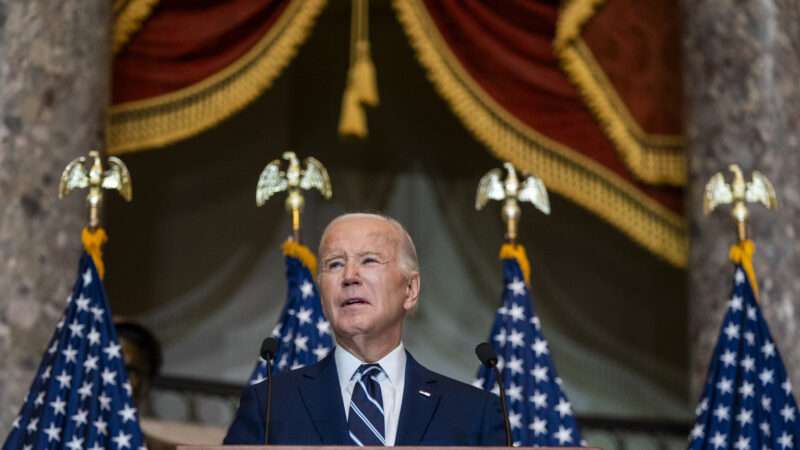

Today, President Biden announced a policy granting "parole in place" to undocumented immigrant spouses of US citizens who have been in the US for at least 10 years, and meet some other criteria. Those eligible can apply for parole status. If they get it, they will then have a three-year period during which they will have work permits and can apply for
"green card" permanent residency (that status will eventually also enable them to apply for citizenship). Currently spouses of US citizens are already eligible to apply for green cards. But if they entered the US illegally, they are required to meet onerous conditions, such as first leaving the United States, and staying away for up to ten years. About 500,000 people could potentially benefit from the program.
The grant of parole will enable them to dispense with these requirements. Under Section 245 of the Immigration and Nationality Act, undocumented immigrants who have been granted parole may have their status adjusted to that of temporary legal residents. That adjustment would dispense with various penalties for unlawful entry, including the requirement to leave the US for a long period of time before applying for a green card.
The moral and policy case for this step is obvious. Granting legal residency to spouses of US citizens keeps families intact, and enables these people to work legally. The latter will benefit both their families and the broader US economy. And letting them get green cards without having to leave the country for many years also helps prevent cruel family separations. That has obvious benefits for the immigrants, themselves, their US-citizen spouses, and their children (who are also US citizens). Don't take my word for it! Take that of the social conservatives who have (rightly) insisted for decades that intact families are good for children, and for the broader community. If you believe in "family values," you have every reason to support the administration's new policy here.
Some will argue we must always enforce every law to the hilt, and thus that it is wrong to give illegal migrants any reprieve. But if you really believe all law-breakers should be punished, then you must also insist it's wrong to let off the hook the millions of Americans who routinely engage in minor traffic law violations or transgress a variety of other laws that are rarely enforced against most violators, such as the federal ban on marijuana possession. A "just enforce the law" approach would require authorities to punish a majority of adult Americans, as most of us have violated federal criminal law at one point or another (to say nothing of state and local laws and regulations).
If, on other hand, you think it's justifiable to forego punishment in cases where inflicting it would cause great harm or injustice, or where doing so diverts law enforcement resources from more important priorities, then there is a strong case for granting reprieves to undocumented migrants who fled horrible poverty and oppression. Their case for forbearance is actually stronger than that of those who engaged in minor speeding, marijuana possession, or other crimes that most Americans are happy to see go unpunished, in most situations. That reasoning applies with even greater force in a situation where a reprieve for the migrants would greatly benefit their US-citizen spouses and children.
The legal issues raised by Biden's new policy are more complicated than the moral ones. The relevant statute gives the president the power to grant parole entitling non-citizens to temporary legal residence, "on a case-by-case basis for urgent humanitarian reasons or significant public benefit."
This is the same statute under which Biden earlier granted parole to Ukrainians fleeing the Russian invasion of their country, and to migrants from four Latin American nations (Cuba, Nicaragua, Venezuela, and Haiti, the "CNVH" countries) wracked by oppression and violence. A coalition of twenty red state governments filed a lawsuit challenging the legality of the CNVH program. In March, federal District Judge Drew Tipton (a conservative Trump appointee whose court the states picked because they expected him to be sympathetic to their cause) ruled the states lacked standing to bring the case. That ruling is now on appeal.
As in the CNVH case, there is a strong argument that parole for spouses of US citizens is backed by "urgent humanitarian reasons." Deporting such people (or requiring them to leave the country for many years to become eligible for legal residency) inflicts serious harm on their families, including many children. There is also a strong case that this grant of parole creates "significant public benefit." As already noted, keeping families intact benefits the larger community, as well as the families themselves. Again, don't take my word for it! Take that of pro-family social conservatives (as well as many social scientists across the political spectrum).
If, as is likely, conservative red states challenge the new policy in court, they will probably focus on the requirement that parole only be granted on a "case-by-case basis," and claim that the administration's rules are too categorical. This issue has come up in the CNVH case, and I addressed it in some detail in my amicus brief in that case (filed on behalf of the Cato Institute and MedGlobal, as well as myself) (pp. 11-20). I think most of the points made there apply to parole for spouses of citizens, as well. I summarize the most important points in a September 2023 article in the Hill:
[A]ny case-by-case decision-making must be guided by rules and presumptions, if it is not to be completely random and arbitrary. And it is entirely reasonable to presume that migrants from nations with horrifically oppressive governments, widespread violence and economic crisis, have urgent humanitarian needs.
The same goes for the presumption that paroling people from these countries will reduce pressure on the southern border, as it actually has [thereby creating a significant public benefit]….
Similarly, it is reasonable to presume that families have an "urgent humanitarian need" to stay together, and that keeping them together is a significant public benefit.
It is worth noting that parole in place has been used since 2007 to protect spouses of US military servicemembers from deportation (a policy begun by administration of Republican President George W. Bush). That policy, too, relies on general rules and presumptions: that keeping servicemembers' families intact is a humanitarian imperative, and that it creates significant public benefits.
As in the CNVH case, a legal challenge to Biden's new parole-in-place policy will raise standing issues. State standing issues in the two cases have some obvious similarities, but there may also be some differences. My own view is that states should have broad standing rights to challenge a variety of federal policies, including those that—like this one—I think should be upheld on the merits. But, in recent years, the Supreme Court and some lower federal courts have taken a harder line on state standing, including in some challenges to immigration policies. I may have more to say about standing questions later, once cases challenging the policy have actually been filed.
In sum, this is a good policy, and it is authorized by the parole power granted to the executive by Congress. But it will almost certainly be challenged in court, in what may turn out to be a prolonged legal battle.
The post Biden Grants "Parole in Place" to Undocumented Immigrant Spouses of US Citizens appeared first on Reason.com.







